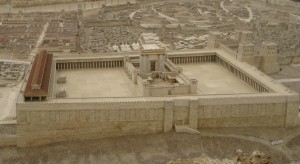The Angel Comes to the Priest Zacharias
When Zacharias goes into the temple to offer incense, he is entering the Sanctuary, which is distinct from the larger temple grounds, as indicated by the Greek term naos (in Luke 1:9), which usually points to the Sanctuary (compare Luke 23:45; Revelation 11:2). According to the Mishnah, which is a compilation of Jewish laws dating from the era before A.D. 200, a priest is allowed only once during his lifetime to light the incense. This lighting takes place twice a day at the temple, once in the morning and once about three o’clock in the afternoon in connection with the offering of the morning and evening sacrifices and the times of prayer (1 Chronicles 16:40; Acts 3:1). Because of the large number of priests, a person is selected by the casting of lots. Hence, this occasion is the most important in Zacharias’s long years of service at the temple.
The King James text says that “there appeared unto [Zacharias] an angel” (Luke 1:11). The
verb is in the passive and means “an angel was seen [by Zacharias].” There is no sense of vision or dream or divinely imposed distance between the angel and the priest. Zacharias sees the angel in a firsthand, sensory way. Luke writes that the angel stands “on the right side of the altar of incense.” Here he writes from the angel’s point of view. It is the altar’s right side. Exactly in front of the temple’s veil stands the incense altar; to Zacharias’s right, or on the north, as he approaches the altar, stands the table of the shewbread, where the twelve loaves of bread sit; to Zacharias’s left rests the large candelabrum or Menorah. The angel stands between the altar and the Menorah, between the cloud of smoke and the light, symbols of the Lord’s covenant with Abraham and of His presence among the Hebrews during the Exodus (Genesis 15:10–11, 17–18; Exodus 13:21–22). Moreover, the angel stands on the south or right side of the altar, the side of promise and blessing. This position characterizes his message to Zacharias. Because of the Israelites’ orientation toward the east—the doors of the sanctuary were on its east side, for instance—the right hand is on the south. If the angel had appeared on the north side of the altar, it would have signaled bad news for Zacharias.
Three elements stand out in the angel’s words to this man. The first is embedded in the expression “thy prayer is heard.” The prayer that the angel points to is likely not a prayer for a son. The pronoun is singular and therefore does not include Elisabeth; besides, she is past childbearing. So why pray for a child? Rather, the prayer is one for the redemption of Israel that Zacharias offers in his priestly role as a matter of private but set worship. Hence, the angel is promising the fulfillment of his prayer for Israel’s redemption.
The second item is much more surprising—the promise that “thy wife Elisabeth shall bear thee a son.” After all, “Elisabeth was barren” and “well stricken in years” (Luke 1:7). No one could be more surprised than Zacharias. After the sweet anticipation of children when this couple is first married and after all of the disappointment that envelopes them as the years roll by, such a prospect seems unbelievable. And, of course, Zacharias expresses his disbelief and pays a price for it (Luke 1:18–20).
The third has to do with the stature of the promised child. In words that may well stun Zacharias, he learns that this child “shall be great in the sight of the Lord.” Further, “many of the children of Israel shall he turn to the Lord their God.” Most dazzlingly, “he shall go before [the promised Messiah] in the spirit and power of Elias, to turn the hearts of the fathers to the children . . . to make ready a people prepared for the Lord” (Luke 1:15–17).
What seems often to become lost is Zacharias’s sturdy character. Here is a man who stands up to an angel, exhibiting exceptional courage. To be sure, he reveals a lack of belief for which he receives a rebuke. But the list of those who have questioned the Divine in some way is short, and impressive. Among others, the list includes Enoch (Moses 6:31), Moses (Exodus 3:11), Jeremiah (Jeremiah 1:7), and Mary (Luke 1:34). Not bad company. But Zacharias steps beyond mere questioning and, with his words, “Whereby shall I know this?” asks for a sign. But the results of the angel’s penalties—deafness and dumbness—are very positive. In the first place, these penalties will force the faithful but disbelieving priest to roll the angel’s message through his mind again and again during succeeding months. In the second, those who are at the temple that day, who witness his difficulty (Luke 1:22), and those who know him well will sense that something special is afoot. And when he returns for his next assignment at the temple in a little fewer than six months, people at the temple will be reminded of his experience, thus preparing them and their acquaintances for the ministry of Zacharias’s son.
—Based on The Testimony of Luke by S. Kent Brown.


